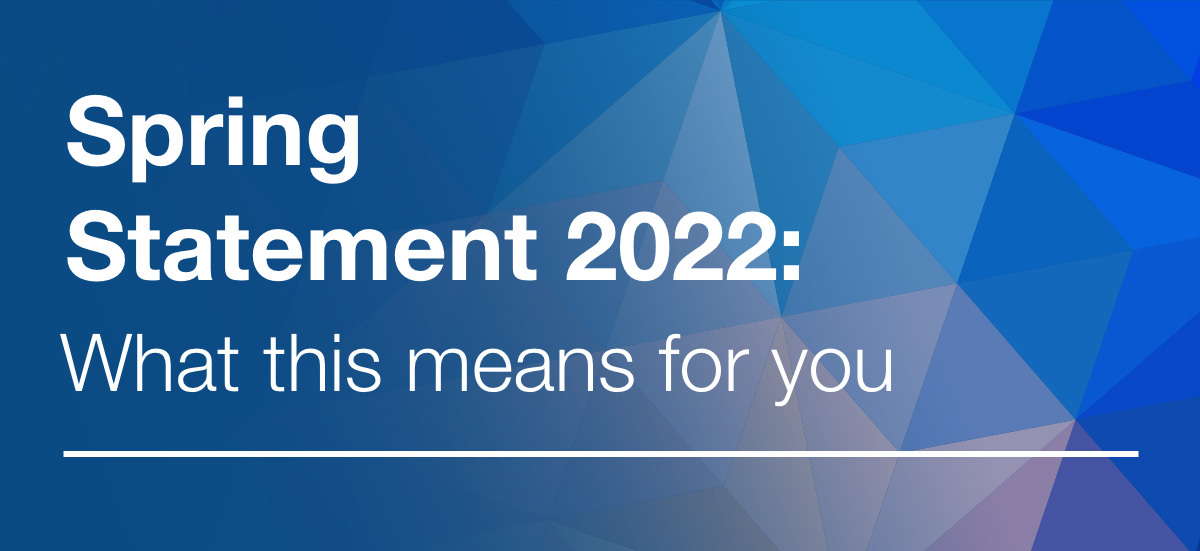TaxCalc Blog
News and events from TaxCalc
Spring Statement analysis

The Chancellor’s Tax Plan is available to read in full here: Tax Plan (gov.uk)
The Chancellor of the Exchequer, Rishi Sunak, presented his Spring Statement to Parliament today, Wednesday 23 March 2022, and the tax experts at TaxCalc were on hand to analyse and disseminate the finer details.
Understandably, the Chancellor opened his speech expressing sympathy for the people of Ukraine and paying tribute to soldiers in the Ukrainian army. He said the UK has a moral responsibility to use its economic strength to help Ukraine with economic and humanitarian aid, as well as sanctions against Russia. However, he warned the actions taken against Russia are not without cost and present a risk to our economic recovery.
The Chancellor saved his biggest announcements until the end of his speech and these were as follows:
National Insurance Contributions primary threshold rise
As predicted by tax commentator Rebecca Cave, the NIC primary threshold will rise to £242 per week, (£1,048 per month) to align with the personal allowance of £12,570 per annum. This will be effective from July 2022 and save the taxpayer over £330. The cut, worth over £6 billion in total, will benefit almost 30 million working people. It may also help people understand exactly when they will begin to pay tax on their earnings (NIC of course being a tax).
This measure also reduces Class 2 NIC liabilities to nil on profits between the Small Profits Threshold (SPT) and LPL. This will ensure that no one earning between the SPT and LPL will pay any Class 2 NIC, while allowing individuals to be able to continue to build up National Insurance credits.
Employment Allowance will rise to £5,000
The Employment Allowance – a relief which allows smaller businesses to reduce their employers National Insurance Contributions bill each year – will rise from £4,000 to £5,000. The cut is worth up to £1,000 for half a million smaller businesses and starts in two weeks’ time, on 6 April. As a result, 50,000 of these businesses will be taken out of paying NIC and the Health and Social Care Levy, taking the total number of firms not paying NIC and the Levy to 670,000.
Income tax to be reduced to 19p
A commitment to reduce the basic rate of income tax by 1p by the end of this parliament in 2024. Bringing the basic rate of tax down from 20p to 19p, a timely and perhaps cynical incentive for election year. The cut will be worth £175 on average for 30 million people, some £5 billion in total, for workers, savers and pensioners and will be the first cut to the basic rate in 16 years.
VAT will be abolished on energy saving materials
VAT will be abolished on energy saving materials such as insulation, solar panels and heat pumps (currently 5%). The Chancellor was keen to point out that this measure was only possible as a result of our exit from the European Union.
Fuel duty cut by 5p
Popular with motorists, fuel duty for petrol and diesel will be cut by 5p per litre from 6pm tonight (23 March) to help drivers across the UK with rising costs – a tax cut worth £2.4 billion. This is the biggest cut ever on all fuel duty rates and means a one-car family will now save on average £100. This cut will be effective for 12 months until March 2023.
R&D tax reliefs will be reformed
R&D tax reliefs will be reformed to deliver better value for money for the taxpayer while being more generous where they can make the most difference. The scope of reliefs will also be expanded to cover data, cloud computing and pure maths. Further announcements to be made in the Autumn budget later this year.
New business rate reliefs
The Chancellor also announced two new business rates reliefs which will be brought forward by a year to come into effect in April 2022. The first being a 50% cut and the second providing relief from business rates due on a range of green technology used to decarbonise buildings, including solar panels and batteries whilst eligible heat networks will also receive 100% relief. Together these will save businesses more than £200 million over the next five years.
Increase in National Insurance Contributions
Finally, the planned increase in National Insurance Contributions from April 2022, earmarked for Health and Social Care, will indeed go ahead despite many calls for it to be delayed or scrapped altogether.
Companies House Reform. A closer look.
Join our webinar
Wed 4 April - 2.30PM
Navigate the proposed Companies House Reform changes
with our information-packed webinar.




